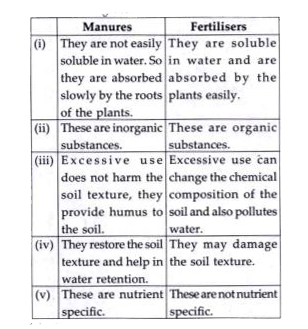Give any four differences between manures and fertilisers.
Step-by-Step Solution
1. Definition:
- Manures: Manures are organic substances derived from the decomposition of animal excreta, such as cow dung and human waste. They are rich in organic matter.
- Fertilizers: Fertilizers are substances that can be organic or synthetic, used to enhance soil fertility and provide essential nutrients to plants.
2. Origin:
- Manures: They have a natural origin, being produced from animal waste and plant materials.
- Fertilizers: They can be of natural origin or artificially synthesized in factories.
3. Nutrient Content:
- Manures: Generally, manures are less rich in nutrients compared to fertilizers. They provide a broad range of nutrients but in smaller quantities.
- Fertilizers: Fertilizers are highly concentrated and rich in specific nutrients essential for plant growth, such as nitrogen, phosphorus, and potassium.
4. Preparation:
- Manures: Manures can be prepared at home or on farms through the composting of organic waste.
- Fertilizers: Fertilizers are typically manufactured in industrial settings through chemical processes.
5. Examples:
- Manures: Examples include cow dung, compost, and green manure.
- Fertilizers: Examples include urea, diammonium phosphate (DAP), and NPK (Nitrogen, Phosphorus, Potassium).
Summary of Differences
| Feature | Manures | Fertilizers |
|--------------------|----------------------------------------------|-----------------------------------------|
| Definition | Organic matter from animal excreta | Organic or synthetic substances |
| Origin | Natural origin | Can be natural or synthetic |
| Nutrient Content | Less rich in nutrients | Highly rich in specific nutrients |
| Preparation | Prepared at home or on farms | Manufactured in factories |
| Examples | Cow dung, compost, green manure | Urea, DAP, NPK |
- Manures: Manures are organic substances derived from the decomposition of animal excreta, such as cow dung and human waste. They are rich in organic matter.
- Fertilizers: Fertilizers are substances that can be organic or synthetic, used to enhance soil fertility and provide essential nutrients to plants.
- Manures: They have a natural origin, being produced from animal waste and plant materials.
- Fertilizers: They can be of natural origin or artificially synthesized in factories.
- Manures: Generally, manures are less rich in nutrients compared to fertilizers. They provide a broad range of nutrients but in smaller quantities.
- Fertilizers: Fertilizers are highly concentrated and rich in specific nutrients essential for plant growth, such as nitrogen, phosphorus, and potassium.
- Manures: Manures can be prepared at home or on farms through the composting of organic waste.
- Fertilizers: Fertilizers are typically manufactured in industrial settings through chemical processes.
- Manures: Examples include cow dung, compost, and green manure.
- Fertilizers: Examples include urea, diammonium phosphate (DAP), and NPK (Nitrogen, Phosphorus, Potassium).
| Feature | Manures | Fertilizers |
|--------------------|----------------------------------------------|-----------------------------------------|
| Definition | Organic matter from animal excreta | Organic or synthetic substances |
| Origin | Natural origin | Can be natural or synthetic |
| Nutrient Content | Less rich in nutrients | Highly rich in specific nutrients |
| Preparation | Prepared at home or on farms | Manufactured in factories |
| Examples | Cow dung, compost, green manure | Urea, DAP, NPK |
Topper's Solved these Questions
Similar Questions
Knowledge Check
Following are the differences between manures and fertilisers.
Which of the given differences are incorrect?
 A(ii) and (v) onlyB(i), (ii) and (v) onlyC(iii) and (iv) onlyD(i), (iii) and (v) only
A(ii) and (v) onlyB(i), (ii) and (v) onlyC(iii) and (iv) onlyD(i), (iii) and (v) only
State any three points of difference between manures and fertilizers.
View SolutionGive any four differences between tracheids and vessels.
View SolutionGive any four differences between rhizome and bulb.
View SolutionCompost || Vermicompost || Green manures || Fertilizer || Difference between manures and fertilisers
View SolutionWhat are 'manures' and 'fertilizers' ?
View SolutionList any four differences between sperm and ovum.
View SolutionWrite any four differences between lanthanoids and actinoids.
Lanthanoids
Actinoids
View Solution
